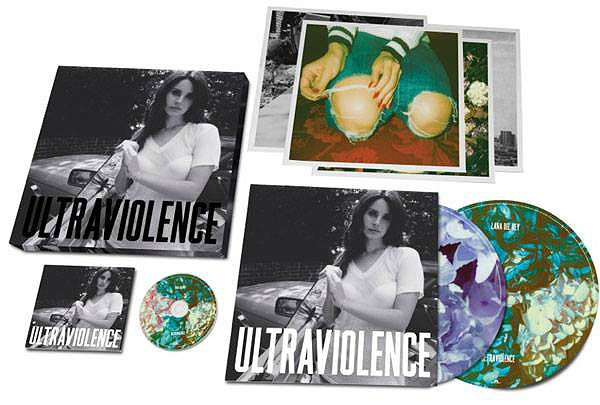Ever since she revealed in January that her new album was "finished, wrong and exquisite", the hype has been slowly building for the release of Lana Del Rey's new album Ultraviolence.
The album's title, a reference to Anthony Burgess's controversial novella A Clockwork Orange, is an appropriate marker for the album's tone. It's a dark, uneasy offering, and when it's at its best, it drips with a beauty that is as compelling as it is disturbing. Del Rey's vocals are at time angelic, at times haunting and discomforting - helped along by the carefully crafted mess of noise that accompanies them.
There's also a thread of wicked irony running through much of Ultraviolence - following 'Pretty When You Cry' with 'Money Power Glory' takes the tone from one extreme to the other with immense, seductive skill.
Does it live up to the hype? In a word, yes. For many more words, keep reading.
'Cruel World'
Could there be anything more American than the line, "I got your bible and your gun"? The chorus of 'Cruel World' is a sprawling expanse of orchestral allure that, in truth, deserves to be encased in a better verse. It's not an opener that immediately grabs you, but Del Rey is confident enough to let the album slowly, steadily suffocate you with its beauty.
'Ultraviolence'
Though it's dripping with haunting beauty, the lyrics to 'Ultraviolence' have been met with a degree of controversy. The song features the line, 'He hit me and it felt like a kiss" - a reference to the 1962 Crystals song of the same name, and a sentiment that seems to somewhat glamourise domestic violence. It's a debate with no easy resolution, but the line, "You're my cult leader" makes it explicit that this is a romantic indoctrination that no one should hope to copy.

'Shades Of Cool'
The opening riff of this song evokes images of James Bond films and Westerns, and its soaring falsetto chorus cuts through the laid-back verse in one fell swoop. The lyrics - "He lives for love, he loves his drugs, he loves his baby too," - are hardly a triumph, but when the tune's this good, that hardly matters.
'Brooklyn Baby'
The opening verse is fairly unremarkable, but the Arabic-influenced bridge signals that this song is anything but ordinary. Del Rey's reputation for submissive narratives seems set to continue with the line, "My boyfriend's in the band, he plays guitar while I sing Lou Reed", but she ends by singing, with a hint of tongue-in-cheek subversion, "Yeah my boyfriend's pretty cool, but he's not as cool as me."
Listen to 'Brooklyn Baby' below
'West Coast'
Though it was the first of Del Rey's new tracks to be revealed, 'West Coast' doesn't really reflect the mood of the rest of the album. That's not to say it's any the worse for it though. It's an ambitious and unusual song, which builds up a rhythm as it approaches the chorus, before completely changing the pace as if everything's just gone into hazy slow motion.
'Sad Girl'
The opening verse hops between octaves with disarming ease, adding a hint of jazz to Del Rey's cinematic soundscape. In fact, the verse is so immediately compelling that it's a shame the chorus, in its repetition of "I'm a sad girl, I'm a bad girl, I'm a sad girl" becomes a little trite.
'Pretty When You Cry'
Del Rey's voice sounds almost arrestingly juvenile in the track's verse; and the tune almost like a lullaby - both of which add to a sense of childlike naivety that is, thankfully, undercut by the mocking sardonicism of the lyrics. "I'll wait for you babe, that's all I do babe, don't come through baby, you never do, because I'm pretty when I cry."

'Money Power Glory'
In stark, and probably deliberate, contrast to 'Pretty When You Cry', there's no hint of submissiveness here. "You talk lots about God, freedom comes from the call. But that's not what this bitch wants, not what I want at all - I want money, power and glory." It's gracefully, unashamedly depraved, and the gritty electric guitar that kicks in halfway through is a welcome addition.
'Fucked My Way Up To The Top'
According to a Grazia interview with Del Rey, this song's about "a singer who first sneered about my allegedly not authentic style but later she stole and copied it." Though the chorus strikes the right note, it's a shame about the lazy aggression of "I'm a dragon, you're a whore, don't even know what you're good for." Rather than fuelling creativity, the feud behind this one seems to have stood in the way of the imaginative, ellusive lyrics Del Rey is capable of. Still the best song title on the album though.

'Old Money'
The closest in sound to Born To Die-era Del Rey, 'Old Money' provides a welcome break from the dark, cluttered beauty of the 9 preceding tracks, but it also shows how far her sound has developed in just two and a half years. It's a pleasant, poignant song, but it somehow lacks the weight and depth of what's come before it.
'The Other Woman'
It was, on first inspection, a strange decision to end Ultraviolence with a cover, but this Nina Simone song blends in seamlessly with the rest - from its lyrical content to the long, drawn-out notes and close vibrato of Del Rey's vocals, which contain more than a hint of Judy Garland. It's charmingly anachronistic, but still drips with the darkness that envelopes the rest of Ultraviolence.
Utraviolence will be released on 16 June. Del Rey has some European festivals planned for this summer, but currently no UK dates.


